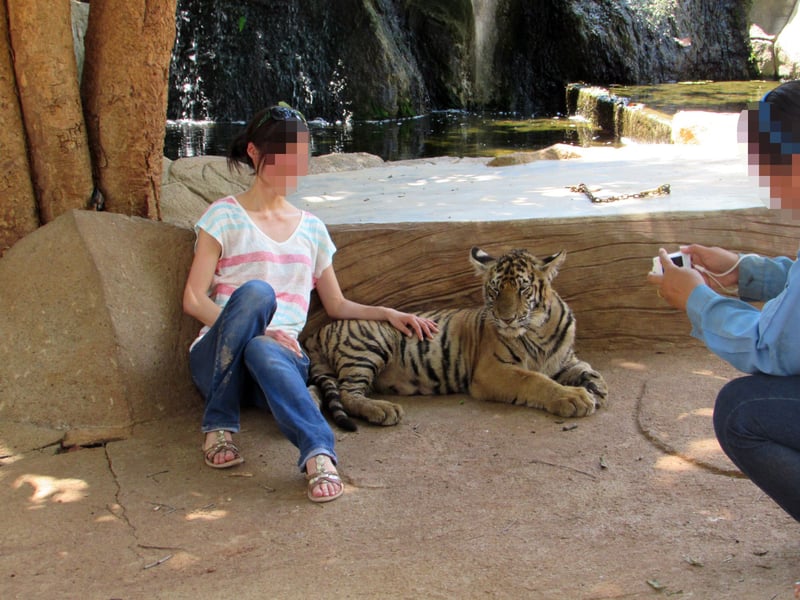
The true scale of Thailand’s tiger selfie tourism
Press release
International animal charity exposes the suffering behind the trend. In the wake of the scandal and closure of Thailand’s Tiger Temple, World Animal Protection exposes the true scale of abuse of captive tigers at the hands of Thailand’s tiger tourism industry.
The report, ‘Tiger selfies exposed: a portrait of Thailand’s tiger entertainment industry’ is the first comprehensive study of the tiger entertainment industry in Thailand.
The global charity uncovers a fast expanding tiger tourism industry with a third more captive tigers (33%) in Thailand in the last five years. At time of our investigations in 2015 and beginning of 2016 there were 830 tigers in captivity at entertainment venues, compared to the 623 in Thailand when we first researched this issue in 2010.
Tiger entertainment venues are increasingly popular attractions where tourists can get up close and personal for a ‘once in a life-time’ encounter with a wild tiger in captivity.
Besides a worrying trend in the growing numbers of tigers, the report also evidences the intensity of the cruelty involved in tigers being submissive enough to entertain tourists.
The main welfare concerns witnessed by the investigators at these tourist venues were:
- Tiger cubs who are separated from their mothers, two to three weeks after they are born
- Young cubs being presented to tourists, constantly viewed and mishandled hundreds of times a day, which can lead to stress and injury
- Tigers being punished using pain and fear in order to stop aggressive unwanted behaviour. One staff member told our researchers that starvation is used to punish the tigers when they make a ‘mistake’
- Most tigers were housed in small concrete cages or barren enclosures with limited access to fresh water. 50% of the tigers we observed were in cages with less that 20sqm per animal, a far cry from the 16-32km they would roam in a single night in the wild
- One in ten (12%) of the tigers we observed showed behavioural problems; such as repetitive pacing, biting their tales. These behaviours most commonly occur when animals feel they cannot cope with stressful environments or situations.
Of all of the seventeen major tiger entertainment venues we investigated in Thailand, it was Sriracha Tiger Zoo in Pattaya that has the highest number of tigers in captivity, this venue is also the one where we observed the poorest conditions -at least one tiger was so thin the hips and ribs were visible.
Julie Middelkoop, Head of the Wildlife – Not Entertainers campaign at World Animal Protection says: “It is very worrying that at the time of our research 207 more tigers were abused for tourist entertainment than there were 5 years ago.
“We’re asking tourists to think about the welfare of the tigers, and we’re calling on the travel industry to stop promoting and profiting from tiger cruelty. If you can get up close, hug or have a selfie with a tiger it’s cruel and don’t go.”
World Animal Protection is calling for:
- Governments worldwide to investigate tiger entertainment venues and close down those that show evidence of illegal trade, cruelty or neglect
- TripAdvisor and other travel companies to end their sales and promotion of cruel wildlife entertainment attractions
- Travellers to stay away from any wildlife tourist entertainment venues that allows direct human-animal interaction, such as hugging and selfies with tigers.
Middelkoop continues: “TripAdvisor, the largest travel site in the world, continues to promote and sell tickets to cruel tiger tourist venues. They could be a real part of the solution and help to end the suffering of tigers.”
ENDS
Note to editors
For an interview with a spokesperson, contact Kai Akram kaiakram@worldanimalprotection.org, +44 (0) 7939 029 006
Moving footage and still images of welfare concerns in tiger venues is available
More than 410,000 people have so far signed the World Animal Protection petition calling on TripAdvisor to stop promoting and profiting from cruel wildlife tourist entertainment [link to petition].
There are approximately 3,890 tigers left in the wild.